Unit 6 Do you like bananas?单元复习课件(共23张PPT)
文档属性
| 名称 | Unit 6 Do you like bananas?单元复习课件(共23张PPT) |  | |
| 格式 | zip | ||
| 文件大小 | 925.3KB | ||
| 资源类型 | 试卷 | ||
| 版本资源 | 人教新目标(Go for it)版 | ||
| 科目 | 英语 | ||
| 更新时间 | 2022-12-13 10:34:41 | ||
图片预览

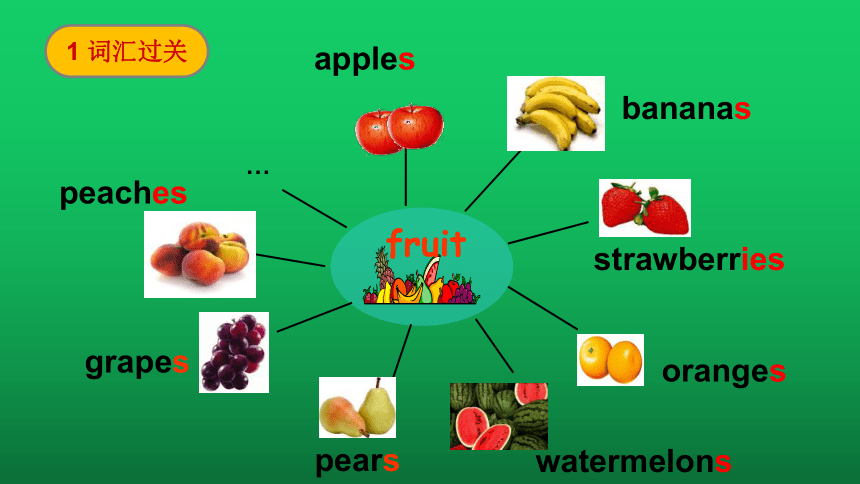
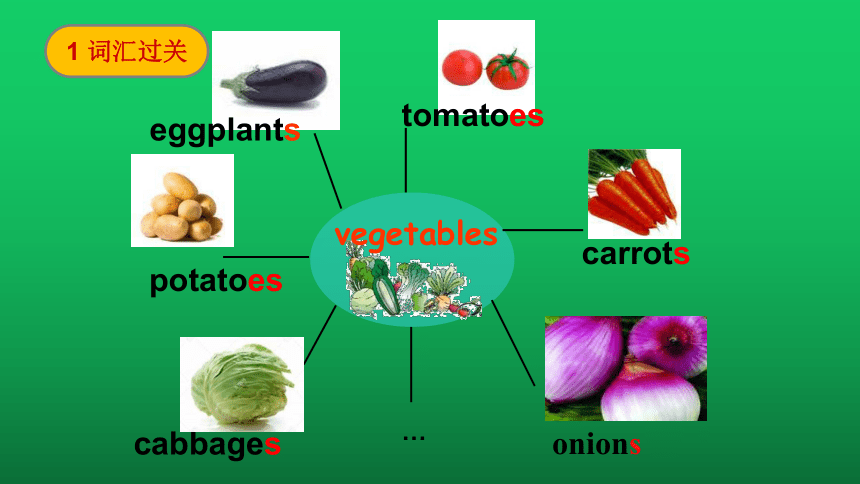
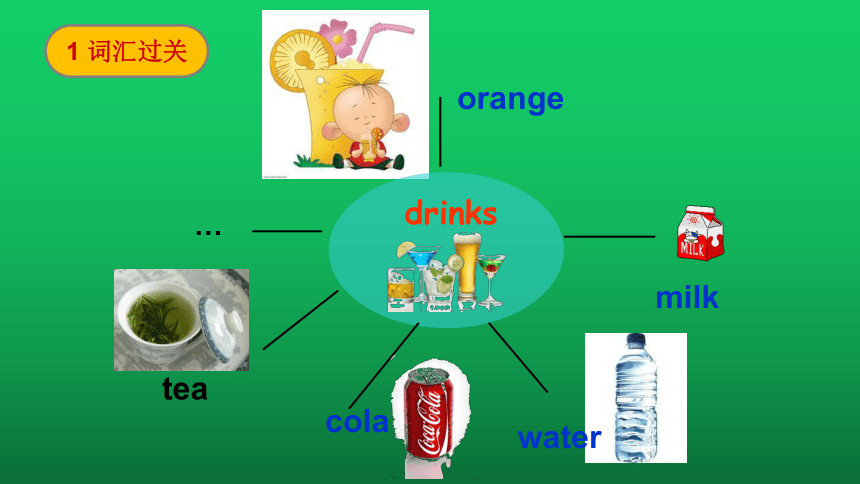
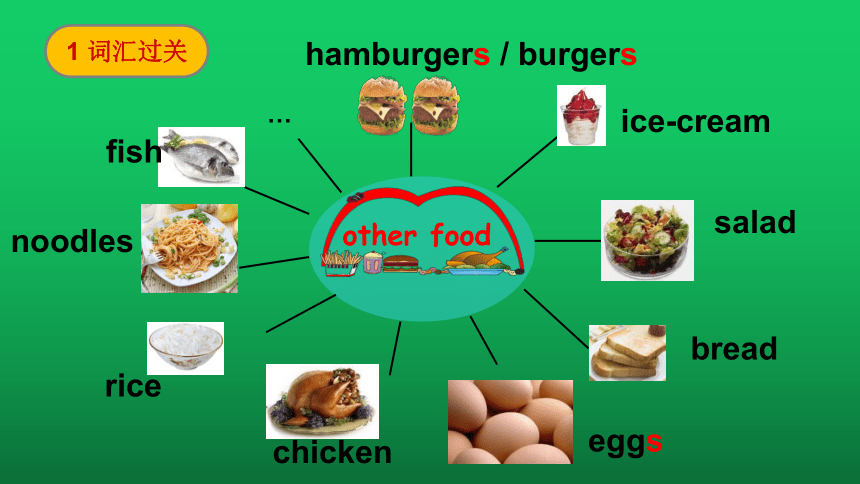
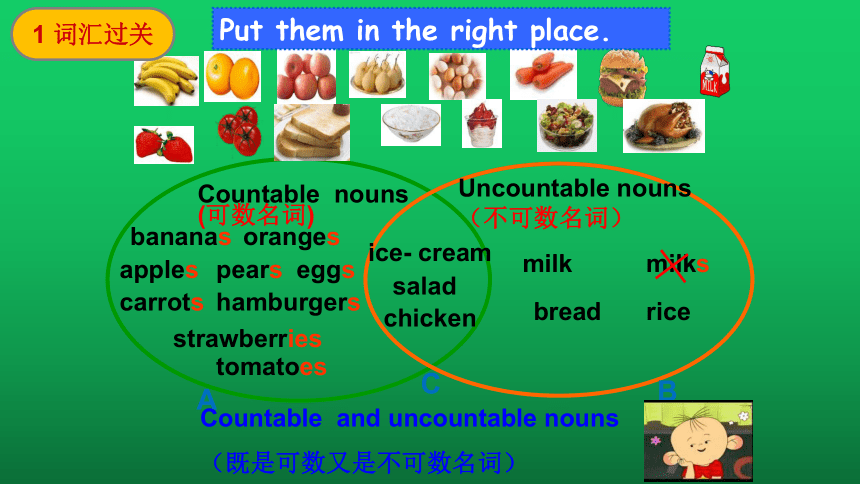
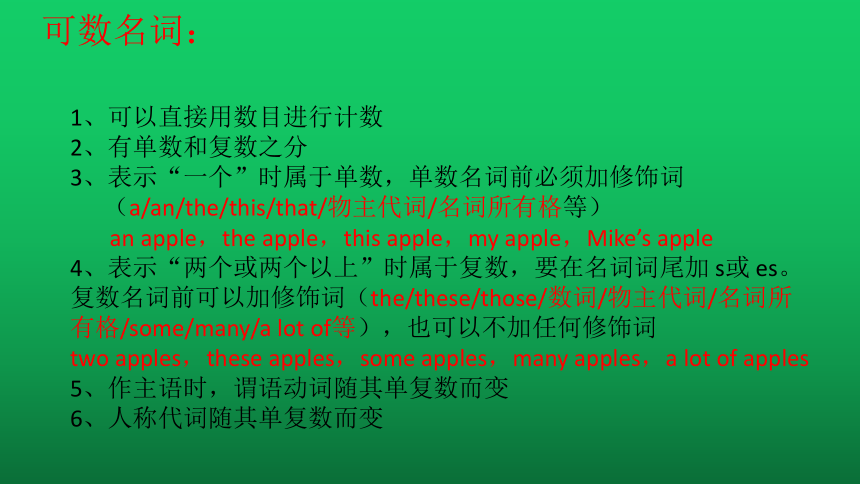
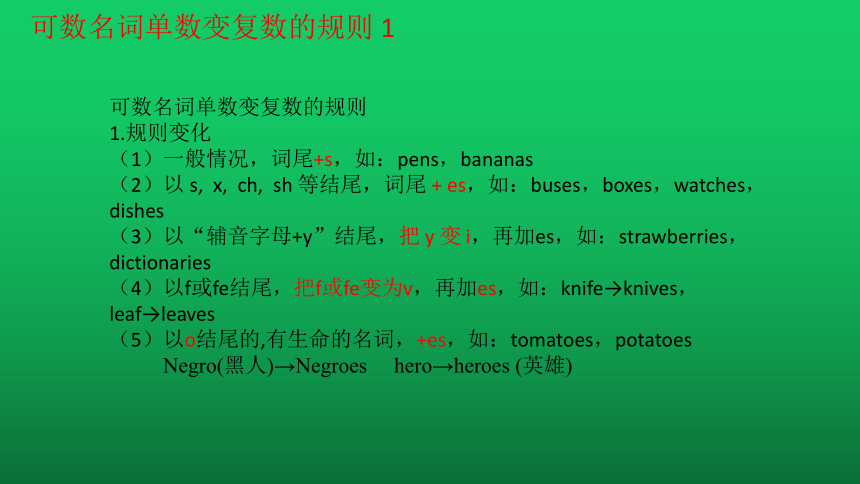
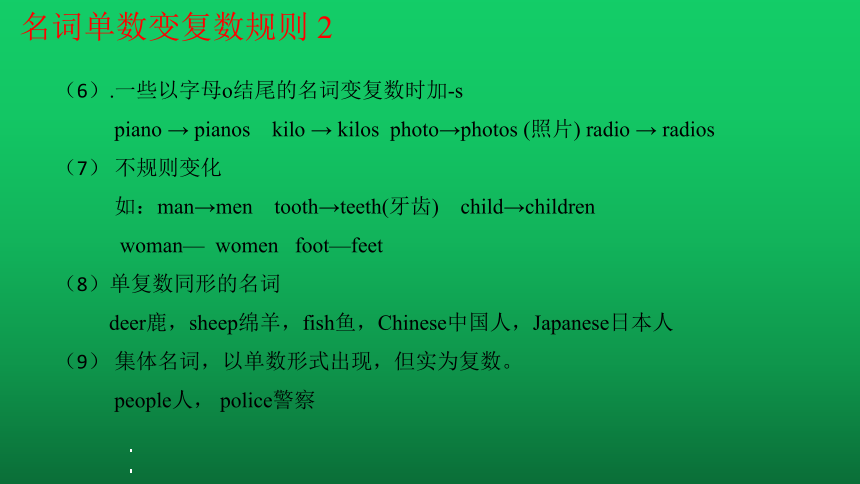
文档简介
(共23张PPT)
Unit6单元复习课件
人教新目标版七年级上册
bananas
apples
…
strawberries
oranges
pears
fruit
grapes
watermelons
peaches
1 词汇过关
…
carrots
potatoes
vegetables
tomatoes
cabbages
eggplants
onions
1 词汇过关
…
drinks
milk
orange
cola
water
tea
1 词汇过关
other food
hamburgers / burgers
ice-cream
chicken
eggs
…
bread
salad
rice
fish
noodles
1 词汇过关
Countable nouns (可数名词)
Countable and uncountable nouns
(既是可数又是不可数名词)
Uncountable nouns (不可数名词)
ice- cream
salad
chicken
milk
bananas
oranges
apples
pears
carrots
eggs
tomatoes
strawberries
hamburgers
milks
bread
rice
A
B
C
Put them in the right place.
1 词汇过关
1、可以直接用数目进行计数
2、有单数和复数之分
3、表示“一个”时属于单数,单数名词前必须加修饰词
(a/an/the/this/that/物主代词/名词所有格等)
an apple,the apple,this apple,my apple,Mike’s apple
4、表示“两个或两个以上”时属于复数,要在名词词尾加 s或 es。
复数名词前可以加修饰词(the/these/those/数词/物主代词/名词所有格/some/many/a lot of等),也可以不加任何修饰词
two apples,these apples,some apples,many apples,a lot of apples
5、作主语时,谓语动词随其单复数而变
6、人称代词随其单复数而变
可数名词:
可数名词单数变复数的规则
1.规则变化
(1)一般情况,词尾+s,如:pens,bananas
(2)以 s, x, ch, sh 等结尾,词尾 + es,如:buses,boxes,watches,dishes
(3)以“辅音字母+y”结尾,把 y 变 i,再加es,如:strawberries,dictionaries
(4)以f或fe结尾,把f或fe变为v,再加es,如:knife→knives,leaf→leaves
(5)以o结尾的,有生命的名词,+es,如:tomatoes,potatoes
Negro(黑人)→Negroes hero→heroes (英雄)
可数名词单数变复数的规则 1
名词单数变复数规则 2
(6).一些以字母o结尾的名词变复数时加-s
piano → pianos kilo → kilos photo→photos (照片) radio → radios
(7) 不规则变化
如:man→men tooth→teeth(牙齿) child→children
woman— women foot—feet
(8)单复数同形的名词
deer鹿,sheep绵羊,fish鱼,Chinese中国人,Japanese日本人
(9) 集体名词,以单数形式出现,但实为复数。
people人, police警察
一般情况下在词尾加______。
以__________________结尾的名词在词尾加 es。
以___结尾的名词_____在词尾加 es______加 s。
以____________结尾的名词,将______,再加_____。
以_____结尾的名词,将_________,再加_____。
可数名词变复数的规则
s
s,x,ch,sh
辅音字母加y
y变为i
es
o
有生命
无生命
f或fe
f或fe变为v
es
注:少数名词的复数形式是不规则的,如:man-men等。
读音规则:
在清辅音后读/s/;如:books
在浊辅音和元音后读/z/;如keys,boys
在/s/,/z/,/ /,/t /,/d /等后读/ z/;如oranges
Grammar重点语法
1、不能直接用数目进行计数。
2、没有复数形式。
3、不可数名词前可以加修饰词
(the/物主代词/名词所有 格/some/much/a lot of等),
也可以不加任何修饰词。milk,the milk,some milk,
much milk,a lot of milk
4、不能用a/an/数词来修饰,但可用量词短语
(数词+量词+of)来修饰。
如:a piece of bread,two cups of milk
5、作主语时,谓语动词要用单数形式,但若用量词短语
修饰,谓语动词要与量词一致
6、人称代词用it
不可数名词
既可数又不可数名词
不可数名词 可数名词
chicken 鸡肉 鸡
orange 橙汁 橙子
salad 沙拉 强调“份数”
ice-cream 冰激凌 强调“份数”
food 食物 强调“种类”
fruit 水果 强调“种类”
A: I like …,but I don’t like…. Do you like …
B: Yes, I do. / No, I don’t
Group work
C: A likes…, but he/she doesn’t like…
Does B like …
D: Yes, he/she does./No, he/she doesn’t.
1. 生日晚餐 _______________
2. 下一周 _______________
3. 考虑 _______________
4. 怎么样 _______________
5. 听起来不错 _______________
6. 让我们 __________
think about
how/what about
sounds good
Let’s …
2 词组过关
7. 体育明星 _______________
8. 饮食习惯 _______________
9. 询问某人某事 _______________
10. 就早/午/晚餐而言 __________________________
11. 晚餐后 ________________
12. 我不想变胖。 ____________________
birthday dinner
next week
sports star
eating habits
ask sb. about sth.
for breakfast / lunch / dinner
after dinner
I don’t want to be fat.
1.一些牛奶____________
2.一个鸡蛋____________
3. ……怎么样_________
4.下周 ____________
5.玛丽的生日___________
6.水果和蔬菜____________
7.思考,思索____________
8.一位体育明星___________
9.饮食习惯 ____________
10.想变胖____________
11.健康食品____________
some milk
an egg
what/how about…
next week
Mary's birthday
fruit and vegetables
think about
a sports star
eating habits
want to be fat
healthy food
2 词组过关
Sentences重点句型
do和does 引导的一般疑问句
一二复:Do+主语+动词原形+其他?
Yes, 代词+do.
No, 代词+don’t.
三单: Does主语+动词原形+其他?
Yes,代词+does.
No,代词+doesn’t.
1. We like salad.(变一般疑问句并作肯定回答)
3. My father likes fruit.(变一般疑问句并作肯定回答)
Do you like salad Yes, I do.
Does your father like fruit No, he doesn’t.
Sentences重点句型
实义动词一般现在时陈述句
主语(三单)+doesn’t+动词原形+其他.
肯定陈述句:
主语(一二复)+动词原形+其他.
否定陈述句:
主语(一二复)+don’t+动词原形+其他.
主语(三单)+动词三单+其他.
1. 我喜欢健康的食物,但是我不喜欢沙拉。
2.Mike不想变胖,所以他喜欢健康的食物。
I like healthy food,but I don’t like salad.
Mike doesn’t want to be fat,so he likes healthy food.
Exercise
Sentences重点句型
特殊疑问句(实义动词)
问:特殊疑问词+do/does引导的一般疑问句?
答:主语+动词+其他.
1.I have salad for dinner.(对下划线提问)
_______ _______you ______ for dinner
2.They always eat lunch at school.(对下划线提问)
______ ______they always eat lunch
3.I like eating dinner with my family.(对下划线提问)
_______ ______you like eating dinner with .
Exercise
What do have
Where do
Who do
Sentences重点句型
实义动词一般现在时陈述句
主语(三单)+doesn’t+动词原形+其他.
肯定陈述句:
主语(一二复)+动词原形+其他.
否定陈述句:
主语(一二复)+don’t+动词原形+其他.
主语(三单)+动词三单+其他.
1. 我喜欢健康的食物,但是我不喜欢沙拉。
2.Mike不想变胖,所以他喜欢健康的食物。
I like healthy food,but I don’t like salad.
Mike doesn’t want to be fat,so he likes healthy food.
Exercise
一般现在时实义动词的三单变换规则
一般情况下在词尾加____;
以______________结尾的动词在词尾加 es;
以__________结尾的动词,将_____,再加___;
其他一些特别的动词变换:have-has,be-is等。
s
s,x,ch,sh
辅音字母加y
y变为i
es
Grammar重点语法
1. Let’s_______ _______ (思考)the food.
2. Do you have good ______ ______ (饮食习惯)?
3. I don’t _____ _____ _____ _____ (想变胖)。
4. _____ _____ (…怎么样)the fruit
5. Tom likes ____________(汉堡), but he doesn’t
like _________(冰淇淋)
think about
eating habits
want to be fat
How about
hamburgers
ice-cream
根据汉语完成英语句子
根据汉语或单词首字母提示填写单词
1. I'm_________ (确信的) you can learn English well.
2. I have to_______ _______ (考虑) my idea.
3. There are seven days in a _______ (周).
4. Her ________ (生日) is coming. Let's think about the food.
5. —What are those over there
—There are six ________ on the table. They are really nice and fresh.
sure
think about
week
birthday
tomatoes
Thank you!
Unit6单元复习课件
人教新目标版七年级上册
bananas
apples
…
strawberries
oranges
pears
fruit
grapes
watermelons
peaches
1 词汇过关
…
carrots
potatoes
vegetables
tomatoes
cabbages
eggplants
onions
1 词汇过关
…
drinks
milk
orange
cola
water
tea
1 词汇过关
other food
hamburgers / burgers
ice-cream
chicken
eggs
…
bread
salad
rice
fish
noodles
1 词汇过关
Countable nouns (可数名词)
Countable and uncountable nouns
(既是可数又是不可数名词)
Uncountable nouns (不可数名词)
ice- cream
salad
chicken
milk
bananas
oranges
apples
pears
carrots
eggs
tomatoes
strawberries
hamburgers
milks
bread
rice
A
B
C
Put them in the right place.
1 词汇过关
1、可以直接用数目进行计数
2、有单数和复数之分
3、表示“一个”时属于单数,单数名词前必须加修饰词
(a/an/the/this/that/物主代词/名词所有格等)
an apple,the apple,this apple,my apple,Mike’s apple
4、表示“两个或两个以上”时属于复数,要在名词词尾加 s或 es。
复数名词前可以加修饰词(the/these/those/数词/物主代词/名词所有格/some/many/a lot of等),也可以不加任何修饰词
two apples,these apples,some apples,many apples,a lot of apples
5、作主语时,谓语动词随其单复数而变
6、人称代词随其单复数而变
可数名词:
可数名词单数变复数的规则
1.规则变化
(1)一般情况,词尾+s,如:pens,bananas
(2)以 s, x, ch, sh 等结尾,词尾 + es,如:buses,boxes,watches,dishes
(3)以“辅音字母+y”结尾,把 y 变 i,再加es,如:strawberries,dictionaries
(4)以f或fe结尾,把f或fe变为v,再加es,如:knife→knives,leaf→leaves
(5)以o结尾的,有生命的名词,+es,如:tomatoes,potatoes
Negro(黑人)→Negroes hero→heroes (英雄)
可数名词单数变复数的规则 1
名词单数变复数规则 2
(6).一些以字母o结尾的名词变复数时加-s
piano → pianos kilo → kilos photo→photos (照片) radio → radios
(7) 不规则变化
如:man→men tooth→teeth(牙齿) child→children
woman— women foot—feet
(8)单复数同形的名词
deer鹿,sheep绵羊,fish鱼,Chinese中国人,Japanese日本人
(9) 集体名词,以单数形式出现,但实为复数。
people人, police警察
一般情况下在词尾加______。
以__________________结尾的名词在词尾加 es。
以___结尾的名词_____在词尾加 es______加 s。
以____________结尾的名词,将______,再加_____。
以_____结尾的名词,将_________,再加_____。
可数名词变复数的规则
s
s,x,ch,sh
辅音字母加y
y变为i
es
o
有生命
无生命
f或fe
f或fe变为v
es
注:少数名词的复数形式是不规则的,如:man-men等。
读音规则:
在清辅音后读/s/;如:books
在浊辅音和元音后读/z/;如keys,boys
在/s/,/z/,/ /,/t /,/d /等后读/ z/;如oranges
Grammar重点语法
1、不能直接用数目进行计数。
2、没有复数形式。
3、不可数名词前可以加修饰词
(the/物主代词/名词所有 格/some/much/a lot of等),
也可以不加任何修饰词。milk,the milk,some milk,
much milk,a lot of milk
4、不能用a/an/数词来修饰,但可用量词短语
(数词+量词+of)来修饰。
如:a piece of bread,two cups of milk
5、作主语时,谓语动词要用单数形式,但若用量词短语
修饰,谓语动词要与量词一致
6、人称代词用it
不可数名词
既可数又不可数名词
不可数名词 可数名词
chicken 鸡肉 鸡
orange 橙汁 橙子
salad 沙拉 强调“份数”
ice-cream 冰激凌 强调“份数”
food 食物 强调“种类”
fruit 水果 强调“种类”
A: I like …,but I don’t like…. Do you like …
B: Yes, I do. / No, I don’t
Group work
C: A likes…, but he/she doesn’t like…
Does B like …
D: Yes, he/she does./No, he/she doesn’t.
1. 生日晚餐 _______________
2. 下一周 _______________
3. 考虑 _______________
4. 怎么样 _______________
5. 听起来不错 _______________
6. 让我们 __________
think about
how/what about
sounds good
Let’s …
2 词组过关
7. 体育明星 _______________
8. 饮食习惯 _______________
9. 询问某人某事 _______________
10. 就早/午/晚餐而言 __________________________
11. 晚餐后 ________________
12. 我不想变胖。 ____________________
birthday dinner
next week
sports star
eating habits
ask sb. about sth.
for breakfast / lunch / dinner
after dinner
I don’t want to be fat.
1.一些牛奶____________
2.一个鸡蛋____________
3. ……怎么样_________
4.下周 ____________
5.玛丽的生日___________
6.水果和蔬菜____________
7.思考,思索____________
8.一位体育明星___________
9.饮食习惯 ____________
10.想变胖____________
11.健康食品____________
some milk
an egg
what/how about…
next week
Mary's birthday
fruit and vegetables
think about
a sports star
eating habits
want to be fat
healthy food
2 词组过关
Sentences重点句型
do和does 引导的一般疑问句
一二复:Do+主语+动词原形+其他?
Yes, 代词+do.
No, 代词+don’t.
三单: Does主语+动词原形+其他?
Yes,代词+does.
No,代词+doesn’t.
1. We like salad.(变一般疑问句并作肯定回答)
3. My father likes fruit.(变一般疑问句并作肯定回答)
Do you like salad Yes, I do.
Does your father like fruit No, he doesn’t.
Sentences重点句型
实义动词一般现在时陈述句
主语(三单)+doesn’t+动词原形+其他.
肯定陈述句:
主语(一二复)+动词原形+其他.
否定陈述句:
主语(一二复)+don’t+动词原形+其他.
主语(三单)+动词三单+其他.
1. 我喜欢健康的食物,但是我不喜欢沙拉。
2.Mike不想变胖,所以他喜欢健康的食物。
I like healthy food,but I don’t like salad.
Mike doesn’t want to be fat,so he likes healthy food.
Exercise
Sentences重点句型
特殊疑问句(实义动词)
问:特殊疑问词+do/does引导的一般疑问句?
答:主语+动词+其他.
1.I have salad for dinner.(对下划线提问)
_______ _______you ______ for dinner
2.They always eat lunch at school.(对下划线提问)
______ ______they always eat lunch
3.I like eating dinner with my family.(对下划线提问)
_______ ______you like eating dinner with .
Exercise
What do have
Where do
Who do
Sentences重点句型
实义动词一般现在时陈述句
主语(三单)+doesn’t+动词原形+其他.
肯定陈述句:
主语(一二复)+动词原形+其他.
否定陈述句:
主语(一二复)+don’t+动词原形+其他.
主语(三单)+动词三单+其他.
1. 我喜欢健康的食物,但是我不喜欢沙拉。
2.Mike不想变胖,所以他喜欢健康的食物。
I like healthy food,but I don’t like salad.
Mike doesn’t want to be fat,so he likes healthy food.
Exercise
一般现在时实义动词的三单变换规则
一般情况下在词尾加____;
以______________结尾的动词在词尾加 es;
以__________结尾的动词,将_____,再加___;
其他一些特别的动词变换:have-has,be-is等。
s
s,x,ch,sh
辅音字母加y
y变为i
es
Grammar重点语法
1. Let’s_______ _______ (思考)the food.
2. Do you have good ______ ______ (饮食习惯)?
3. I don’t _____ _____ _____ _____ (想变胖)。
4. _____ _____ (…怎么样)the fruit
5. Tom likes ____________(汉堡), but he doesn’t
like _________(冰淇淋)
think about
eating habits
want to be fat
How about
hamburgers
ice-cream
根据汉语完成英语句子
根据汉语或单词首字母提示填写单词
1. I'm_________ (确信的) you can learn English well.
2. I have to_______ _______ (考虑) my idea.
3. There are seven days in a _______ (周).
4. Her ________ (生日) is coming. Let's think about the food.
5. —What are those over there
—There are six ________ on the table. They are really nice and fresh.
sure
think about
week
birthday
tomatoes
Thank you!
同课章节目录
- starters 预备篇(2012秋审查)
- Unit 1 Good morning !
- Unit 2 What’s this in English?
- Unit 3 What color is it ?
- Unit 1 My name's Gina.
- Section A
- Section B
- Unit 2 This is my sister.
- Section A
- Section B
- Unit 3 Is this your pencil?
- Section A
- Section B
- Unit 4 Where's my schoolbag?
- Section A
- Section B
- Unit 5 Do you have a soccer ball?
- Section A
- Section B
- Unit 6 Do you like bananas?
- Section A
- Section B
- Unit 7 How much are these socks?
- Section A
- Section B
- Unit 8 When is your birthday?
- Section A
- Section B
- Unit 9 My favorite subject is science.
- Section A
- Section B
